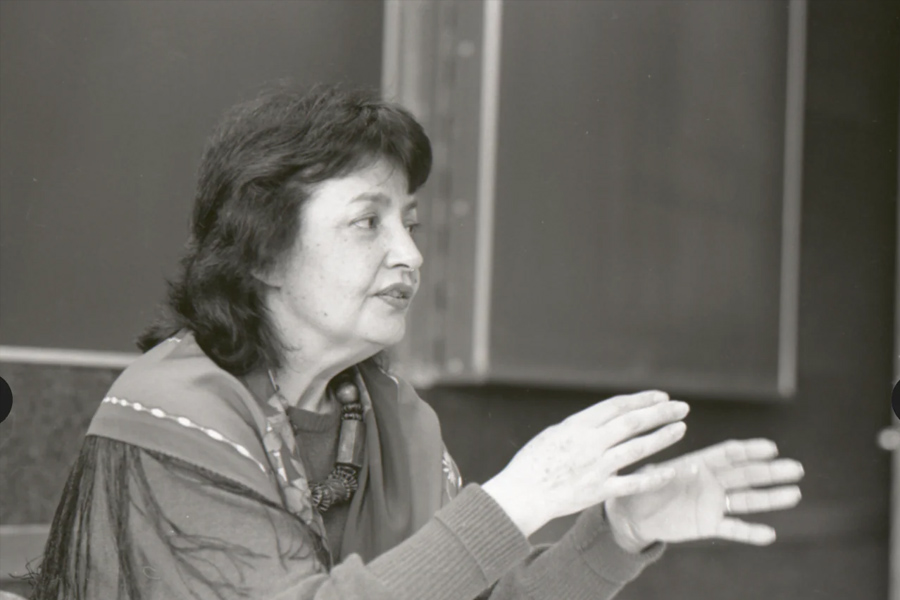Basic Information
| Field | Details |
|---|---|
| Full name | Marie-Josèphe “Josie” Dublé |
| Known as | Josie Fanon |
| Birth | c. 1930–1931 |
| Birthplace | Lyon region, France |
| Heritage | Corsican and Romani roots; daughter of left‑wing trade unionists |
| Nationality | French; later based in Algeria |
| Occupations | Journalist; political activist; collaborator on Frantz Fanon’s work |
| Spouse | Frantz Fanon (m. October 1952; d. 1961) |
| Children | Olivier Fanon (b. 1955) |
| Extended family | Mireille Fanon‑Mendès France (Frantz’s daughter from another relationship) |
| Residence after 1961 | Algiers, Algeria |
| Death | 1989, Algiers; death by suicide; exact date reported as either 10 January or 13 July |
| Known for | Political journalism, anticolonial advocacy, stewardship of Fanon’s legacy |
From Lyon to the Maghreb: Early Life and Meeting Frantz Fanon
Josie Fanon was born Marie-Josèphe Dublé in the Lyon region around 1930–1931, a child of the working-class left. Accounts describe her as the daughter of trade-unionists, with Corsican and Romani roots that colored her understanding of marginality, solidarity, and the twinned promises and perils of Europe’s postwar era. She entered adulthood in a France wrestling with colonial collapse and political reinvention.
In Lyon she met Frantz Fanon, a Martinican medical student whose incandescent political mind was already turning toward Algeria. They married in October 1952. Their partnership, personal and political, formed at the hinge of history. In the years that followed, as Fanon moved between clinics, frontlines, and editorial rooms—from Blida-Joinville in Algeria to exile and clandestine work in Tunis—Josie moved with him. She was not merely present; she was essential.
Collaborator and Co-Worker: Inside the Fanon Writing Process
Frantz Fanon often dictated—rapidly, relentlessly. Josie listened. She typed, transcribed, organized. The cadence of his thought moved through her hands, becoming pages and, ultimately, books that would travel the world. Beyond the mechanics of dictation, she guarded tone, emphasis, and continuity, helping to transform the urgency of ideas into durable text.
After Fanon’s death in 1961, that guardianship grew heavier. Josie worked to shape public understanding of his work and its publication, arguing for fidelity to his revolutionary commitments. The result was not the creation of a legend out of thin air, but the maintenance of a living legacy with its contradictions intact—a task that required stamina, judgment, and an unblinking sense of political purpose.
Motherhood and Family Ties
In 1955, Josie and Frantz welcomed their son, Olivier. He later emerged as a public voice in discussions of his father’s ideas and the family’s experiences, appearing in commemorations and conversations that sought to return Fanon to living debate rather than frozen iconography. In the broader orbit, Mireille Fanon‑Mendès France—Frantz’s daughter from another relationship—figures prominently in public work around Fanon’s legacy. While not Josie’s child, her presence underscores the complex human tapestry behind a name often treated as singular.
Details about Josie’s parents remain largely unrecorded in public archives beyond the often-repeated “daughter of trade-unionists.” The absence itself is a reminder: many women who carried political movements were noted for their function, not fully documented for their lives.
Journalist and Political Actor in Independent Algiers
After 1961, Josie settled in Algiers. As Algeria stepped into independence, the city became a crucible for Third Worldism, a crossroads where exiles, revolutionaries, and writers traded tactics and texts. Josie wrote and commented from within this milieu. She became a journalist and political analyst, a voice that refused to “museumify” anticolonialism. Her compass pointed toward live struggles, not nostalgic ones, and she spoke with particular clarity about Palestine, drawing a line from one liberation to another.
Her journalism didn’t court celebrity. It sought alliances. In her public work, you can detect the same exacting insistence that animated her efforts to keep Fanon’s legacy anchored to the world that birthed it: the decolonizing world, young and imperfect, beautiful and beleaguered.
Family at a Glance
| Member | Relation | Years | Notes |
|---|---|---|---|
| Frantz Fanon | Husband | 1925–1961 | Psychiatrist, writer, anticolonial thinker; married Josie in October 1952 |
| Olivier Fanon | Son | b. 1955 | Public interlocutor on Fanon’s legacy; engaged in commemorative and organizational roles |
| Mireille Fanon‑Mendès France | Stepdaughter (Frantz’s daughter) | b. 1948 | Prominent figure in scholarship and activism related to Fanon’s work |
Key Dates and Milestones
| Date | Event |
|---|---|
| c. 1930–1931 | Birth of Marie-Josèphe “Josie” Dublé in the Lyon region, France |
| October 1952 | Marriage to Frantz Fanon |
| 1955 | Birth of their son, Olivier |
| 1954–1961 | Algerian War of Independence; Josie supports Fanon’s medical, editorial, and political work |
| December 1961 | Death of Frantz Fanon |
| 1962 onward | Josie settles in Algiers; continues as journalist and political activist |
| 1989 | Josie Fanon dies in Algiers; published accounts differ on the exact date (10 Jan vs 13 Jul) |
| 2023–2025 | Renewed attention to Josie’s writing, activism, and role in shaping Fanon’s legacy |
Death and the Disputed Date
All accounts agree: Josie Fanon died in Algiers in 1989, by suicide after years of depression and profound disenchantment with the political trajectory of a country she had invested in with her whole life. Yet the calendar refuses to settle. Some records list 10 January; others, 13 July. The year stands firm, the day wavers—a small but telling measure of how women of movements often slip in and out of official memory.
The ambiguity neither diminishes her life nor absolves a historical record that kept fuller details at the edge of the frame. What remains undeniable is the arc: from Lyon to Algiers, from companion to commentator, from transcription to testimony.
Presence in Archives, Screens, and Public Memory
Josie surfaces in interviews, recorded conversations, and documentary footage devoted to the Fanons and their milieu. She appears in films and retrospectives that revisit the era’s urgent experiments, and actors and directors continue to wrestle with portraying her—someone essential yet under-described. In public commemorations, she is increasingly presented not just as “Fanon’s widow,” but as a journalist who understood that solidarity is a verb.
Her story has traveled in concentric circles: family remembrances, archival broadcasts, essays reappraising her politics. The net effect is a slow re-balancing, restoring her to the field of vision where she always stood.
FAQ
Who was Josie Fanon?
A French-born journalist and political activist, she was also the wife and close collaborator of Frantz Fanon.
When and where was she born?
She was born around 1930–1931 in the Lyon region of France.
What was her role in Frantz Fanon’s writing?
She frequently transcribed and organized his dictated texts and later helped protect the integrity of his published legacy.
Did Josie Fanon have children?
Yes, she and Frantz Fanon had a son, Olivier, born in 1955.
Where did she live after 1961?
She settled in Algiers, remaining engaged in journalism and anticolonial politics.
What political causes did she support?
She was active in Third World and anticolonial circles and spoke forcefully in solidarity with Palestinian liberation.
When did she die?
She died in Algiers in 1989; published accounts disagree on the exact date (10 January vs 13 July).
How did she die?
Her death was by suicide after a prolonged period of depression and political disillusionment.
Is there information about her parents?
Beyond being described as left-wing trade-unionists, detailed public records of their identities are scarce.
Are there recordings or portrayals of her?
Yes, she appears in archival interviews and documentaries, and has been portrayed in recent films and commemorations.



